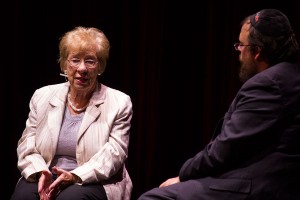Holocaust survivor talks of power of good
Author, speaker and Holocaust survivor Eva Schloss spoke to a full-capacity crowd Tuesday night at Bovard Auditorium about the human stories hidden by the terrible genocide of the Holocaust.

Holocaust survivor · Eve Schloss discusses the Holocaust experience to a packed audience of students in Bovard Auditorium. – Joseph Chen | Daily Trojan
The event, hosted by USC Chabad and USC Shoah Foundation, featured Schloss, who is best known as the childhood friend and posthumous step-sister of Holocaust victim Anne Frank, whose diary became an international bestseller. Born in Vienna, Austria in 1929, Schloss’ life was changed forever during the Nazi invasion of 1938.
Schloss spoke with clear recollection of those early war years.
“It was a great shock to us,” Schloss said. “Life changed immediately. Being a Jew became very difficult.”
Facing anti-Semitism and possible arrest, Schloss’ father sought a business opportunity in Holland. It is here where she first met Frank.
Schloss remembered what Frank said to her when they first met.
“My name is Anne, and my family comes from Germany, and I can speak German to you.” Frank told Schloss.
This sparked an immediate friendship, though the two were, in Schloss’ words, “completely different types.”
“I was a tomboy,” Schloss said. “I loved sports. I was also quite shy. Anne was a big chatterbox.”
Schloss also remembered Frank’s obsession with the opposite sex, emphasized in her famous diary.
“When I explained to her that I had an older brother, her eyes grew big,” Schloss said of Frank. “She was very interested in boys.”
The girls’ relationship ended with the Nazi occupation of Holland, which forced both families into hiding. Schloss said she felt immense boredom during this period, with no interest in reading or writing. This, however, was unlike her brother Heinz, an accomplished musician, painter and poet whose work Schloss advertises to this day.
After two years, the family was betrayed, arrested and crammed into train cars. When Schloss and hundreds of fellow Jewish families arrived at their destination, they were crushed.
“We knew Auschwitz was the biggest death camp,” Schloss said. “We had hoped it was a labor camp.”
Schloss said she and her mother were then separated from their male family members and how the women in the camp were completely dehumanized, forced to shave their heads and live on two small meals a day.
“That is really how they wanted us to feel – not like human beings, like animals,” Schloss said.
Of the two families, only Schloss, her mother and Anne Frank’s father, Otto, survived the nine months of captivity. Schloss attributes her survival to mental strength and hope for a better future.
“I had a beautiful family life before the war,” Schloss said. “I wanted to have a boyfriend, a family. I wanted to experience life.”
Schloss told the audience how her mother would later marry Otto Frank, making the two girls step sisters. Otto Frank served as a grandfather to Schloss’ children, and the two shared a mission to publish Anne Frank’s diary. Initial attempts were not fruitful, according to Schloss, as guilt surrounding the Holocaust prevented most media coverage of the subject.
“There was a huge [feeling of guilt] in the world,” Schloss said. “Both Jews and Christians wanted to push it under the table and move on.”
The diary eventually found a publisher and became famous throughout the world. Schloss highlighted the common misconception about her step sister’s story.
Schloss highlighted the story is one much more than the Holocaust.
“Anne’s story was not a Holocaust story,” Schloss said. “It was the story of a young girl.”
Students and visitors in the packed auditorium were struck by the power of Schloss’ words. Ross Denny-Jiles, a freshman majoring in theatre, commended her dedication to anti-genocide work.
“Sometimes we forget about these types of things when we don’t live in an area where we see them everyday,” Denny-Jiles said. “It’s good to be reminded that there is still hatred in the world.”
To Schloss, individual human goodness, which she saw in Heinz Schloss and Anne Frank, is the only way to counteract the evil brought on by outright xenophobia.
“The power of good is immeasurable,” Schloss said. “So is that of hope, optimism and resilience.”
Schloss was careful to point out, however, that she sees herself not as a hero, but as a survivor.
“Survivors aren’t heroes,” Schloss said. “The people that put themselves in harm’s way when they didn’t have to be — the resistance fighters — those are the real heroes.”
